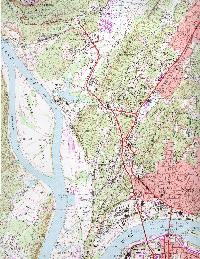The Company had plans like those of most enterprises of the time, planning to extend lines to a number of far-flung communities in Southeast Tennessee and Northwest Georgia. Again, like most companies of its time, their plans never came to fruition, and only two lines were built. One of these lines went from North Chattanooga to the top of Signal Mountain. The second, the Dry Valley line, was built later to serve the Red Bank community. CTC at the same time built a connection to the Cincinnati, New Orleans & Texas Pacific Railway near the road's bridge over the Tennessee River.
Passenger service was terminated in mid-1934, but freight continued to be moved by electric motors until 1940, when it was decided by the Southern Railway, which had acquired the Company's property in 1936, that the continued operation of those motors was uneconomical. In 1941, the use of the electric motors and overhead lines were discontinued and two small diesel locomotives were acquired, financed in part by the sale of the scrapped copper wires.
Later on that decade, the diesels were replaced by two other locomotives of higher horsepower (one was #4, a 600 HP EMD SW1, the other was #5, a 1200 HP EMD SW9).
The next major event in the history of the CTC came in 1969, when the CNO&TP directly absorbed the CTC, along with three other subsidiaries and at the same time the CNO&TP became a direct subsidiary of the Southern Railway. With this change the Traction Company truly lost its identity, since their locomotives, which were lettered for the Chattanooga Traction Company were repainted as Southern locomotives, and could only be distinguished by the small letters CT under the locomotive number on the cab sides.

View a map of the Traction Company route in Red Bank, North Chattanooga, and at the foot of Signal Mountain. This file is about 620 K in size so it may take a while to download if you're on a slow internet connection. This is a USGS topographic map and is in the public domain.
 |
 |
 |